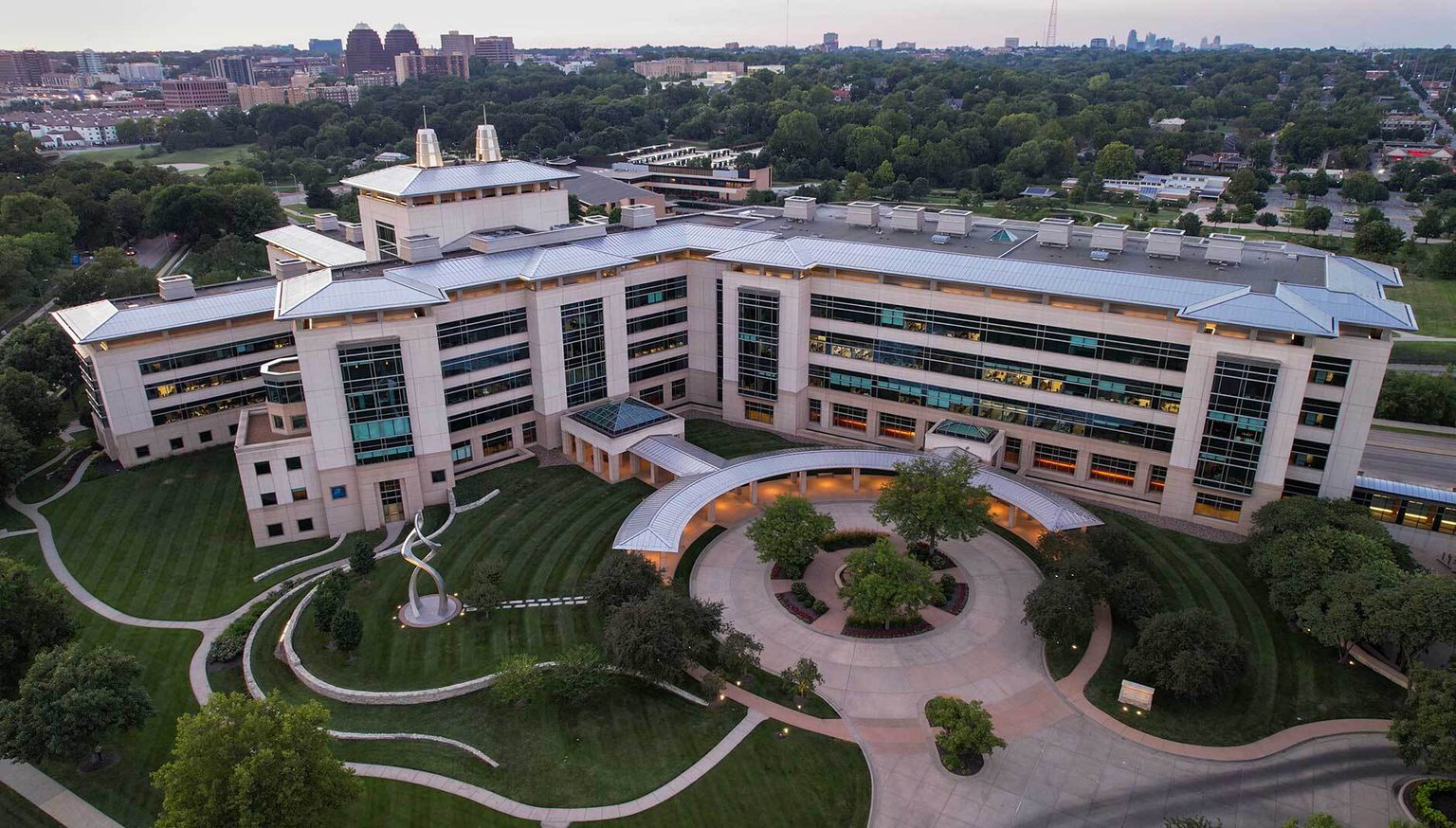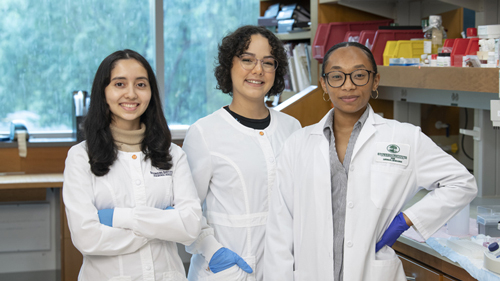News

18 December 2025
2025 in Review
Eleven key moments and achievements from the Stowers Graduate School in 2025
Read Article
The Graduate School of the Stowers Institute for Medical Research
News
Four recent graduates selected to participate in a year-long mentored intership at Stowers.

Brenda Sanchez, Shanaika Vargas Rivera, Enya Dewars
The Graduate School of the Stowers Institute for Medical Research (GSSIMR) is committed to preparing young scientists whose innovative approaches to research will revolutionize twenty-first century biology. With that goal in mind, this year GSSIMR introduced the Stowers Research Scholars postbaccalaureate program.
The Stowers Research Scholars program is a one-year mentored fellowship for recent undergraduates that was developed to increase diversity at GSSIMR, which will enhance the quality of the educational program and also contribute to increased diversity in science. Participation is open to US citizens or permanent residents with an undergraduate degree in a STEM field who are interested in pursuing an advanced research degree, and preference is given to members of communities traditionally underrepresented in STEM.
Creation of the program was led by Dean of the Graduate School Matt Gibson, PhD. He began the planning in early 2020 but has been interested in the idea of a postbac program since before being appointed dean in 2019. His goal was to create a program that provides an important stepping stone for students from underrepresented backgrounds to get lab experience and discover whether they want to pursue further education in science.
That vision is why Enya Dewars is at Stowers right now. Dewars, along with Brenda Sanchez, and Shanaika Vargas Rivera, joined Stowers in June in the first installment of scholars. A fourth scholar, Helena Raposo, will join the program in late August.
Dewars is a recent University of North Carolina-Chapel Hill grad who plans to attend grad school after completing this program. She hopes to someday work on cancer or stem cell research, so working in the Sánchez Alvarado Lab on stem cell and regenerative research seemed like a strong step toward ensuring success in graduate school and beyond.
“I applied to this program because of the opportunities and the doors it can open for my future,” Dewars says. “This program offers a more competitive stipend but also more resources that other programs didn’t have, learning opportunities like microscopy, histology or cytometry.”
Vargas Rivera agrees, mentioning that she likes that the program allows her to take PhD courses and propose her own independent project for her fellowship. Vargas Rivera is from Puerto Rico, where she got a degree in biotechnology. The relocation stipend also caught her eye when she was researching postbac options.
“Our compensation and relocation benefits are second to none, making it easier for recent graduates to hit the ground running and really focus on developing their research skills,” says Gibson.
Another benefit of the program is funding for attending a research conference. This year’s participants will present at the ABRCMS virtual conference, as well as another conference with their lab. Scholars will also attend workshops, seminars, and panel discussions to prepare for applying to graduate school. Vargas Rivera believes this program will prepare her well for graduate school and a research environment similar to what she will encounter in the future.
A key component of this program is full-time immersion in a research lab of their choice, but since prior lab experience is not required, for some this may be their first time in a lab. Along with benchwork, the Scholars can participate in all GSSIMR events and have the option to audit some of the graduate school coursework, if they choose.
“Being presented with an institute that is research only, not education/research, was a complete shift of what I’ve known before, and it was very overwhelming at first,” Vargas Rivera says, but she quickly adapted. “The facilities are advanced, very well organized, and I like the unity of the community. The environment of the lab was very inviting, and it was very important to have an inviting and friendly environment where you can communicate with ease.”
Vargas Rivera is doing a fellowship in the Bazzini Lab, and Assistant Investigator Ariel Bazzini, PhD, sees a lot of potential benefits for her, as well as the other Scholars.
“It is a unique opportunity for her, to start her potential scientific journey with the quality of scientists and state-of-the-art resources we have,” he says. “Sometimes the first step in science can be doing dishes, but this program allows Shanaika to jump directly into a scientific project.”
Bazzini also notes that having a trainee scientist can benefit everyone in the lab, giving the more experienced researchers and postdocs the chance to learn how rewarding it can be to mentor others. Vice Dean of the Graduate School Sarah Zanders, PhD, agrees.
“The scholars are young scientists with great potential, and getting someone like that in your lab is invaluable,” she says. “They give senior predocs and postdocs mentoring experience and they can help move projects forward.”
Scholars also have regular meetings with Assistant Dean for Academic Affairs Jinelle Wint, PhD. With a background in DEI programs, Wint is uniquely suited for the career coaching and guidance that the scholars receive during their fellowship.
The emphasis on mentoring was a draw for Sanchez, a scholar in the Yu Lab. Sanchez also received a BS in biology from UNC-Chapel Hill and was the first in her family to graduate from college. She chose the Stowers Research Scholars program in part because it offered in-person research experience but also because “there was an emphasis on guiding scholars in conducting a research project and in communicating those research ideas through various poster and conference opportunities.”
Now that she’s been in the program for a few weeks, Sanchez is seeing other benefits of being at Stowers. “I’m impressed at the cohesiveness between internal departments (e.g., sequencing, microscopy) and active labs, as well as the number of tools and resources available to promote ongoing research.”
Gibson and Wint are focused on providing the best possible experience for this first group of scholars, but there is also an eye on the future. Both Wint and Zanders hope the program expands in the coming years, allowing opportunities for more scholars, as well as for more labs to host them. Wint says they received many excellent applications for this first year even with limited advertising, so she anticipates more interest next year.
“I am really excited about launching this program this year,” says Wint, “and I can’t wait to see what the future holds.”
News

18 December 2025
Eleven key moments and achievements from the Stowers Graduate School in 2025
Read Article
News
24 November 2025
Students working with Pillai can look forward to studying deep evolutionary biology paired with advanced protein biochemistry and artificial intelligence to investigate and explore these questions.
Read Article
News
19 November 2025
Sankari believes the Stowers Graduate School is a place for emerging scientists to pursue their passions, contribute to discoveries, and achieve success.
Read Article
